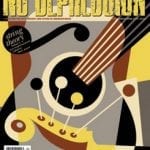Various Artists – Tradition in transition
One gets the impression Eggleston doesn’t stay settled on any one concept too long, which comes as no surprise given the manic nature of his cello playing and stage performing in his years with Crooked Still. He left the band last fall, potentially a major blow given that Eggleston’s genius-level abilities as a musician were a significant element of the band’s identity.
On the other hand, the cupboard was hardly bare with his departure. Banjo player Gregory Liszt spent much of 2006 touring with Bruce Springsteen as a member of the Seeger Sessions Band, and the ties between bassist Corey DiMario and singer Aoife O’Donovan run deep, back to their days as close friends at the New England Conservatory of Music in Boston at the dawn of the decade.
O’Donovan, for her part, is arguably the can’t-miss star-in-the-making among the entire string-band scene, with a voice reminiscent of Alison Krauss and a strong-willed drive that has served her career well. (“I really don’t know anyone more determined than her,” contends Ruth Ungar, O’Donovan’s bandmate in their side-project trio Sometymes Why.)
That determination likely played a role in Crooked Still’s rapid response to the lineup change. Eggleston played his last show with the group in November; by then, they’d recruited not only cellist/fiddler Tristan Clarridge but also fiddler Brittany Haas, and they hit the studio to record their next album in January. (The new lineup’s first public performance took place January 13 in New York City at GlobalFest.)
Not that it was necessarily a given Crooked Still would stay together without Eggleston. “When you’re a quartet, and one of your members who’s been a huge creative part of your sound decides to leave, it definitely crosses your mind to just not do it,” O’Donovan admitted. “But we had spent the past five years building this name for ourselves. And if you look at almost every band that’s successful, there’s been lineup changes.”
Expanding the lineup from a quartet to a quintet — though still without adding a guitarist — was one way of bolstering the band’s foundation after Eggleston’s departure.
“With five people’s ideas being thrown around, and with the introduction of the fiddle as a permanent sound in the lineup, there’s just more possibilities and more things that we’re able to do,” O’Donovan says. “What’ll change, definitely in our live shows, is it’ll be slightly less fly-by-the-seat-of-your-pants craziness, which our fans were definitely familiar with, and sometimes to a fault, with Rushad’s antics, especially toward the end.”
Another somewhat high-profile lineup change on the string-band front last year was the departure of guitarist Chris Eldridge from the Infamous Stringdusters, winners of three International Bluegrass Musicians Association awards in October 2007 (Best Album, Best Song, Best Emerging Artist). Eldridge, however, had a very specific destination: He’s now a member of virtuoso mandolinist Chris Thile’s new ensemble, the Punch Brothers, along with Greg Garrison, Noam Pikelny and Gabe Witcher.
Thile recently went through a major transition of his own when his platinum-selling trio Nickel Creek played its final shows at the Ryman Auditorium in November 2007, after nearly two decades of performing together since their childhood days. The Punch Brothers was a natural next step that evolved from touring to support his 2006 solo album How To Grow A Woman From The Ground.
Punch, the Punch Brothers’ debut disc due February 26 on Nonesuch, takes Thile in grand and ambitious new directions, highlighted by the four-movement, 42-minute piece “The Blind Leaving The Blind”. In an interview for No Depression with writer Craig Havighurst in December 2007, Thile pointed to an epiphany in New York City in 2005 when some of the ideas behind that composition, and what became Punch Brothers in general, began to crystallize.
“There was this moment,” Thile recounted to Havighurst, “as I was playing this thing and looking out of my window in the West Village, I kind of felt some sort of a funny power or ability — I’m young, I’m a musician, and that’s exactly what I want to be. What am I going to do with it? I sat there and said to myself, ‘I haven’t done anything.’ But in a way that’s kind of great. I felt like I can go ahead and start doing things now….It’s taken a long time for everything to come into focus, and having these four really individual, really creative musicians has been integral.”
SWINGING SIDEWAYS
Eldridge’s decision to leave the Infamous Stringdusters for Thile’s new band — he’s since been replaced by guitarist Andy Falco — isn’t the only recent news out of the Stringdusters camp; dobro player Andy Hall also released a solo album, Sound Of The Slide Guitar, in January. Such side-projects are relatively commonplace, of course; for example, North Carolina band Chatham County Line’s recent bluegrass collaboration with Norway’s Jonas Fjeld, as documented in our January-February issue of No Depression.
But a couple of cornerstone acts in the string-band community are currently spinning off side-projects with higher profile and significance than is typical. Both Uncle Earl and the Mammals expect to be on the sidelines for the bulk of 2008 while their members follow diversions down other avenues.
The most prominent of these is the Sparrow Quartet, led by Uncle Earl banjo player Abigail Washburn. Their ace in the hole is renowned banjo master Bela Fleck, who instantly raises the stakes for this outfit, though fiddler Casey Driessen and cellist Ben Sollee are also quite accomplished players.
It’s an unusual lineup — as with Crooked Still, there’s no guitar — but the quartet found a way to make it work. The spark was an opportunity to tour China in support of Washburn’s 2005 solo album Song Of The Traveling Daughter (which had been released by Nettwerk Records just two weeks after Uncle Earl’s Rounder debut She Waits For Night).




